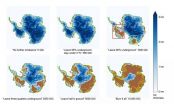INFORMATION:
The research was supported by a grant from the National Institute on Aging (U01 AG010483). Turner reports no personal financial interests related to the study.
About Georgetown University Medical Center
Georgetown University Medical Center (GUMC) is an internationally recognized academic medical center with a three-part mission of research, teaching and patient care (through MedStar Health). GUMC's mission is carried out with a strong emphasis on public service and a dedication to the Catholic, Jesuit principle of cura personalis -- or "care of the whole person." The Medical Center includes the School of Medicine and the School of Nursing & Health Studies, both nationally ranked; Georgetown Lombardi Comprehensive Cancer Center, designated as a comprehensive cancer center by the National Cancer Institute; and the Biomedical Graduate Research Organization, which accounts for the majority of externally funded research at GUMC including a Clinical and Translational Science Award from the National Institutes of Health.
Resveratrol impacts Alzheimer's disease biomarker
2015-09-11
(Press-News.org) WASHINGTON (Sept. 11, 2015) -- The largest nationwide clinical trial to study high-dose resveratrol long-term in people with mild to moderate Alzheimer's disease found that a biomarker that declines when the disease progresses was stabilized in people who took the purified form of resveratrol.
Resveratrol is a naturally occurring compound found in foods such as red grapes, raspberries, dark chocolate and some red wines.
The results, published online today in Neurology, "are very interesting," says the study's principal investigator, R. Scott Turner, MD, PhD, director of the Memory Disorders Program at Georgetown University Medical Center. Turner, who treats patients at MedStar Georgetown University Hospital, cautions that the findings cannot be used to recommend resveratrol. "This is a single, small study with findings that call for further research to interpret properly."
The resveratrol clinical trial was a randomized, phase II, placebo-controlled, double blind study in patients with mild to moderate dementia due to Alzheimer's disease. An "investigational new drug" application was required by the U.S. Food and Drug Administration to test the pure synthetic (pharmaceutical-grade) resveratrol in the study. It is not available commercially in this form.
The study enrolled 119 participants. The highest dose of resveratrol tested was one gram by mouth twice daily -- equivalent to the amount found in about 1,000 bottles of red wine.
John Bozza, 80, participated in the study. Five years ago, his wife, Diana, began noticing "something wasn't quite right." He was diagnosed with mild cognitive impairment, but only a year later, his condition progressed to mild Alzheimer's.
Diana, whose twin sister died from the same disease, says there are multiple reasons she and John decided to participate in the resveratrol study, and they now know he was assigned to take the active drug.
"I definitely want the medical community to find a cure," she says. "And of course I thought there's always a chance that John could have been helped, and who knows, maybe he was."
Patients, like John, who were treated with increasing doses of resveratrol over 12 months showed little or no change in amyloid-beta40 (Abeta40) levels in blood and cerebrospinal fluid. In contrast, those taking a placebo had a decrease in the levels of Abeta40 compared with their levels at the beginning of the study.
"A decrease in Abeta40 is seen as dementia worsens and Alzheimer's disease progresses; still, we can't conclude from this study that the effects of resveratrol treatment are beneficial," Turner explains. "It does appear that resveratrol was able to penetrate the blood brain barrier, which is an important observation. Resveratrol was measured in both blood and cerebrospinal fluid."
The researchers studied resveratrol because it activates proteins called sirtuins, the same proteins activated by caloric restriction. The biggest risk factor for developing Alzheimer's is aging, and studies with animals found that most age-related diseases--including Alzheimer's--can be prevented or delayed by long-term caloric restriction (consuming two-thirds the normal caloric intake).
Turner says the study also found that resveratrol was safe and well tolerated. The most common side effects experienced by participants were gastrointestinal-related, including nausea and diarrhea. Also, patients taking resveratrol experienced weight loss while those on placebo gained weight.
One outcome in particular was confounding, Turner notes. The researchers obtained brain MRI scans on participants before and after the study, and found that resveratrol-treated patients lost more brain volume than the placebo-treated group.
"We're not sure how to interpret this finding. A similar decrease in brain volume was found with some anti-amyloid immunotherapy trials," Turner adds. A working hypothesis is that the treatments may reduce inflammation (or brain swelling) found with Alzheimer's.
The study, funded by the National Institute on Aging and conducted with the Alzheimer's Disease Cooperative Study, began in 2012 and ended in 2014. GUMC was one of 21 participating medical centers across the U.S.
Further studies, including analysis of frozen blood and cerebrospinal fluid taken from patients, are underway to test possible drug mechanisms.
"Given safety and positive trends toward effectiveness in this phase 2 study, a larger phase 3 study is warranted to test whether resveratrol is effective for individuals with Alzheimer's -- or at risk for Alzheimer's," Turner says.
Resveratrol and similar compounds are being tested in many age-related disorders including cancer, diabetes and neurodegenerative disorders. The study Turner led, however, is the largest, longest and highest dose trial of resveratrol in humans to date.
ELSE PRESS RELEASES FROM THIS DATE:
Achieving effective health care with a new approach to caring for chronic illnesses
2015-09-11
CORAL GABLES, Fla. (September 11, 2015) -- Researchers from the University of Miami and Harvard University address the challenges of effective universal health coverage in low- and middle-income countries, focusing on solving one of the most pressing issues: the care of chronic illnesses. Their suggestions, aimed at strengthening health care systems, include recommendations based on a "diagonal approach" for managing health care. Their report is published in the September issue of the journal Health Affairs.
The authors shared their findings on Wednesday, September 9, ...
Burning remaining fossil fuel could cause 60-meter sea level rise
2015-09-11
Washington, DC--New work from an international team including Carnegie's Ken Caldeira demonstrates that the planet's remaining fossil fuel resources would be sufficient to melt nearly all of Antarctica if burned, leading to a 50- or 60-meter (160 to 200 foot) rise in sea level. Because so many major cities are at or near sea level, this would put many highly populated areas where more than a billion people live under water, including New York City and Washington, DC. It is published in Science Advances.
"Our findings show that if we do not want to melt Antarctica, we ...
Burning all fossil energy would eliminate all ice of Antarctica
2015-09-11
Burning all of the world's available fossil-fuel resources would result in the complete melting of the Antarctic ice sheet, a new study to be published in Science Advances shows. The Antarctic ice masses store water equivalent to more than 50 meters of sea-level rise. The new calculations show that Antarctica's long-term contribution to sea-level rise could likely be restricted to a few meters that could still be manageable, if global warming did not exceed 2 degrees. Crossing this threshold, however, would in the long run destabilize both West and East Antarctica - causing ...
Study shows Africanized bees continue to spread in California
2015-09-11
A study conducted by biologists at UC San Diego has found that the Africanized honey bee--an aggressive hybrid of the European honey bee--is continuing to expand its range northward since its introduction into Southern California in 1994.
The study, published in this week's edition of the journal PLOS ONE, found that more than 60 percent of the foraging honey bees in San Diego County are Africanized and that Africanized bees can now be found as far north as California's delta region.
"Our study shows that the large majority of bees one encounters in San Diego County are ...
Neural circuit in the cricket brain detects the rhythm of the right mating call
2015-09-11
Scientists have identified an ingeniously elegant brain circuit consisting of just five nerve cells that allows female crickets to automatically identify the chirps of males from the same species through the rhythmic pulses hidden within the mating call.
The circuit uses a time delay mechanism to match the gaps between pulses in a species-specific chirp - gaps of just few milliseconds. The circuit delays a pulse by the exact between-pulse gap, so that, if it coincides with the next pulse coming in, the same species signal is confirmed.
It's one of the first times ...
Large eyes come at a high cost
2015-09-11
Researchers from Lund University in Sweden have shown that well-developed eyes come at a surprising cost to other organ systems. The study involving Mexican cavefish shows that the visual system can require between 5% and 15% of an animal's total energy budget.
Researchers have long associated the presence of a well-developed brain with major energy consumption. This means that animals that develop advanced nervous systems require environments where this is possible. There has to be good access to nutrients, and every investment in an organ comes at a cost to some other ...
Study supports aggressive treatment of high blood pressure, says ACC president
2015-09-11
WASHINGTON (Sept. 11, 2015) - A statement from American College of Cardiology President Kim Allan Williams Sr., M.D., FACC, regarding the National Institutes of Health stopping the SPRINT trial early after demonstrating the positive benefits of lower blood pressure control targets:
"About 70 million American adults have high blood pressure and only half of them have their condition under control. The preliminary data demonstrates why the cardiovascular community must continue to aggressively fight a condition that leads to stroke, kidney disease and heart problems for ...
Periodontitis and heart disease: Researchers connect the molecular dots
2015-09-11
Washington, DC - September 11, 2015 - Periodontitis is a risk factor for heart disease. Now a team of researchers has shown that a periodontal pathogen causes changes in gene expression that boost inflammation and atherosclerosis in aortic smooth muscle cells. The research is published ahead of print in Infection and Immunity, a journal of the American Society for Microbiology.
The circumstantial evidence that led to this study was ample. The periodontal pathogen, Porphyromonas gingivalis, has also been found in coronary artery plaques of heart attack patients. And in ...
Too many candidates spoil the stew
2015-09-11
This election year has produced 17 Republican presidential candidates, which on its surface may appear to give the party a competitive advantage. Evolution, however, disagrees.
A new study by Michigan State University researcher Arend Hintze and appearing in the current issue of Scientific Reports, says the delicate balance of some, but not too much, competition optimally drives the evolution of decision-making strategies.
"Competition has a unique relationship with our decision-making strategies as humans," said Hintze, an assistant professor at MSU. "Modest competition ...
Nano in food and agriculture: Regulations require collaboration to ensure safety
2015-09-11
An overview of regulatory solutions worldwide on the use of nanotechnology in food and feed production shows a differing approach: only the EU and Switzerland have nano-specific provisions incorporated in existing legislation, whereas other countries count on non-legally binding guidance and standards for industry. Collaboration among countries across the globe is required to share information and ensure protection for people and the environment, according to a JRC co-authored paper.
The paper Regulatory aspects of nanotechnology in the agri/feed/food sector in EU and ...

